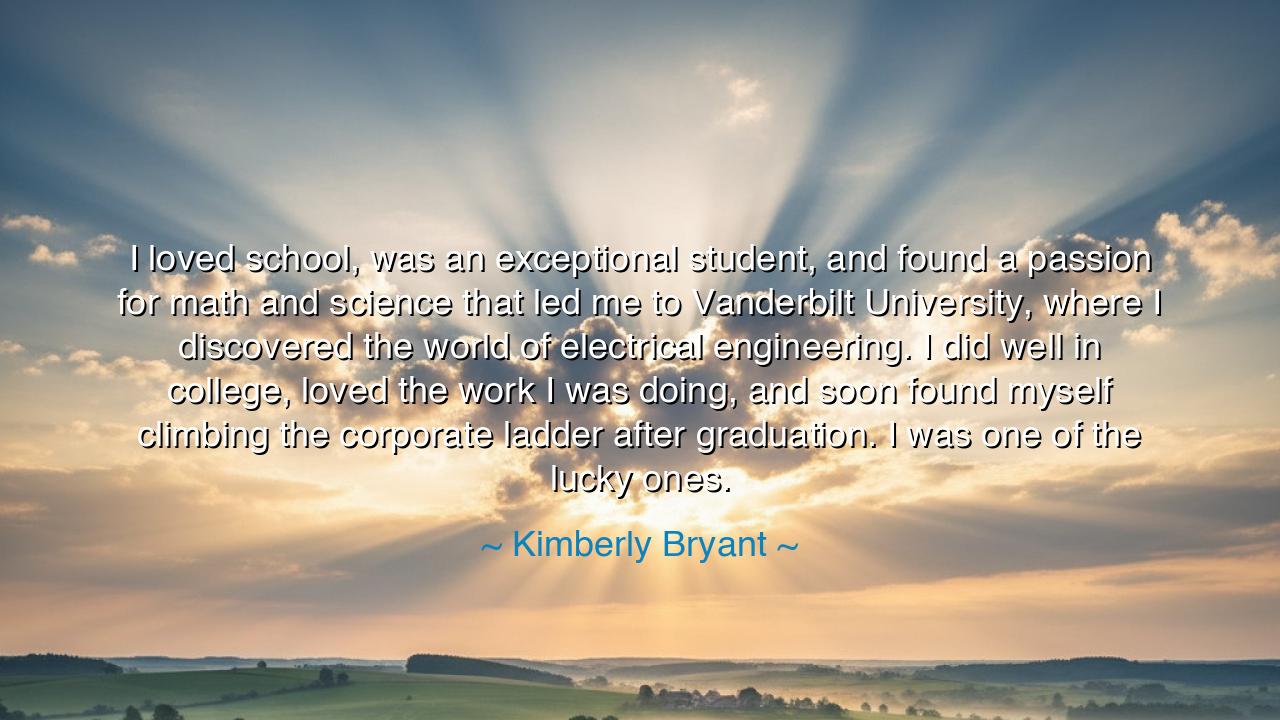
I loved school, was an exceptional student, and found a passion
I loved school, was an exceptional student, and found a passion for math and science that led me to Vanderbilt University, where I discovered the world of electrical engineering. I did well in college, loved the work I was doing, and soon found myself climbing the corporate ladder after graduation. I was one of the lucky ones.






In the words, “I loved school, was an exceptional student, and found a passion for math and science that led me to Vanderbilt University, where I discovered the world of electrical engineering. I did well in college, loved the work I was doing, and soon found myself climbing the corporate ladder after graduation. I was one of the lucky ones,” Kimberly Bryant speaks not only of personal triumph, but of the intricate weave between opportunity, perseverance, and destiny. Beneath the calm cadence of her words lies a heroic journey — the story of a young woman who dared to excel in fields where women, and especially women of color, were rarely seen. Her declaration is both humble and powerful, acknowledging that her rise was not born of privilege alone, but of talent joined with relentless effort — and of a world that, for once, opened its gates just wide enough for her to enter.
The origin of this quote lies in Bryant’s own life, long before she became the visionary founder of Black Girls Code. Born in Memphis, Tennessee, she grew up at a time when the paths of science and technology were seldom paved for Black women. Yet she loved learning — not passively, but fiercely, with a hunger that defied the limits set around her. At Vanderbilt University, she found her calling in electrical engineering, mastering the language of circuits, power, and innovation. It was there, amidst equations and machinery, that she discovered her ability not only to understand the world, but to shape it. To do well in such an environment was no small feat — it was an act of courage in a landscape that often questioned her belonging.
The tone of “I was one of the lucky ones” reveals Bryant’s deep humility — for she knew that luck, in truth, is often the world’s fragile substitute for justice. Many who shared her intellect and drive were denied what she received: access, mentorship, and visibility. In the ancient sense, she was like a traveler who found the single unguarded gate in a fortress — passing through not only for herself, but for those who would come after her. Her gratitude, therefore, is not passive; it is reflective gratitude, the kind that seeks to turn good fortune into responsibility. For Bryant, success was not an end but a summons — a call to make the path broader, fairer, more welcoming for the next generation.
Her story echoes that of Hypatia of Alexandria, the great philosopher and mathematician of the ancient world. Hypatia, too, loved learning for its own sake — mastering science and reason in a society that viewed women as unfit for such pursuits. She taught men and kings alike, not for glory, but for truth. Yet unlike Hypatia, who was ultimately destroyed by the intolerance of her age, Bryant lived in a time when perseverance could bloom into progress. Still, both women share the same sacred lineage: they are architects of knowledge in an age of doubt, proving that intellect has no gender, no color, no boundary but the courage to be pursued.
In Bryant’s words, there is also the timeless rhythm of purpose unfolding — from curiosity to mastery, from mastery to calling. Her journey through education and the corporate world mirrors the hero’s ascent described by philosophers of old: the student who learns not only to understand the system but to transcend it. Yet, as she climbed the corporate ladder, she saw the emptiness that comes when success serves only the self. Thus, she turned back — not in retreat, but in renewal — founding Black Girls Code, so that other young girls might see in technology not exclusion, but empowerment. Through her, luck became legacy.
The meaning of her reflection, then, is not about fortune alone, but about stewardship. To be “one of the lucky ones” is to recognize that success gained in solitude is incomplete. True fulfillment lies in ensuring that others need not rely on luck at all — that what was once rare becomes common, that the gates of opportunity stay open for all. Bryant’s wisdom teaches us that privilege unshared is waste, but privilege transformed into service becomes the foundation of progress.
The lesson is clear: love what you learn, pursue it with discipline, and when the world opens a door for you, hold it open for those who follow. Education, in its truest form, is not accumulation, but transmission — the passing of light from one hand to another. Those who find joy in knowledge, as Bryant did, must also find duty in it. For knowledge without compassion breeds pride, but knowledge guided by empathy builds civilizations.
And the practical action is this: nurture curiosity wherever it burns. If you are a mentor, teach with generosity. If you are a learner, study with love, not only for your own rise but for the rise of others. Remember Kimberly Bryant’s journey — the girl who loved math and became an engineer, the engineer who saw inequality and became a founder, the founder who turned luck into legacy. For in her story lives an ancient truth: that the highest form of wisdom is not knowing, but using what you know to lift another soul toward the light.






AAdministratorAdministrator
Welcome, honored guests. Please leave a comment, we will respond soon